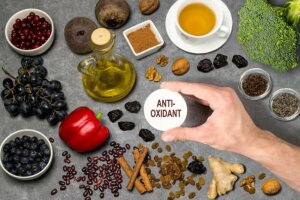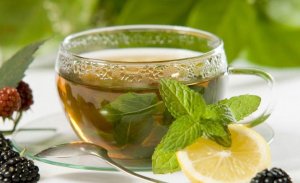Antioxidant Supplements: How Important are they?

Antioxidant supplements are critical compounds when we talk about health. They have important functions in fighting oxidative stress and aging. Antioxidants are substances that can be found in fruits and vegetables, especially in berries such as blueberries. They can also be taken as supplements.
Antioxidants also prevent the emergence of certain illnesses both in the short- and long-term. In athletes, they are also shown to speed-up their recovery and prevent injuries.
In the following article, we’re going to show you the effects of antioxidants in athletes and whether or not it’s necessary to supplement with antioxidants in sports to increase performance. Keep reading!
Antioxidant supplements: oxidation and muscular damage
The relationship between exercise and oxidative stress is complex. It all depends on the intensity, the type, and the duration of the exercise. While moderate exercise seems to be beneficial for oxidative stress and health, intense exercise leads to higher oxidation.
The imbalance between reactive oxygen species and antioxidant defense is what produces oxidative stress. To better the situation, it’s necessary to optimize the consumption of antioxidants. In this way, we can increase both muscle function and the immune system. It can also reduce damage at both the cellular and tissue-level, according to this article published in Nutrition magazine.
Is it necessary to use antioxidant supplements?
Athletes need to consume antioxidants regularly. One reason is that it lowers damage and reduces the probability of injury. Along these lines, you could suppose that antioxidants would provide a performance advantage for certain types of athletes. However, in terms of antioxidant supplements, there’s a lot of disagreement among scientific literature.

This bibliography confirms that it’s possible to get the recommended daily amounts of antioxidants through our diets. Because of this, under normal conditions, it’s not recommended to use supplements.
However, it is possible to evaluate the impact of extra intake of these types of substances on an athlete when they are following an intense exercise regimen. In any case, a nutritionist needs to supervise this.
Antioxidant supplements: the importance of a varied diet
To ensure that antioxidants are adequately absorbed, your best bet is to opt for a varied diet. Regularly consuming differently colored fruits and veggies maximizes the absorption of vitamins and these types of compounds.
In addition, it’s important to choose foods with high antioxidant abilities, such as blueberries, whose properties can prevent aging in the long-term.
Antioxidants and sports: not all that glitters is gold
Despite the positive effects that the consumption of some antioxidants can provide for athletic performance, their long-term consumption in high quantities can actually hurt the athlete’s performance.
That’s according to this article, in which the only positive correlation to improved performance was found to be Vitamin C and N-acetylcysteine. Excessively consuming other substances with antioxidant abilities seems to damage the muscular adaptations to exercise.
Because of this, it’s necessary to be cautious about your supplementation with these types of substances. Don’t abuse their consumption!
However, it’s difficult to get to a situation where you damage an athlete’s adaptations solely through increasing the consumption of antioxidant-rich foods. That’s according to the following article, in which a group of athletes participated in high-elevation training and an elevated intake of antioxidants through their diets.

The results don’t show a large difference in the control group versus the group who ingested more antioxidants. This assures that consuming dietary antioxidants is totally safe and beneficial for athletes. Only excessive supplementing causes harm.
Points to keep in mind!
Antioxidants are important for your health. They reduce muscular and cellular damage in athletes. Because of this, it’s of the highest importance to ensure their consumption for adequate performance and to reduce your risk of injury.
However, the intake of these substances through a healthy diet is enough! Except in cases of extreme stress and intense training or when scientific literature doesn’t support the use of antioxidant supplements.
Antioxidant supplements are critical compounds when we talk about health. They have important functions in fighting oxidative stress and aging. Antioxidants are substances that can be found in fruits and vegetables, especially in berries such as blueberries. They can also be taken as supplements.
Antioxidants also prevent the emergence of certain illnesses both in the short- and long-term. In athletes, they are also shown to speed-up their recovery and prevent injuries.
In the following article, we’re going to show you the effects of antioxidants in athletes and whether or not it’s necessary to supplement with antioxidants in sports to increase performance. Keep reading!
Antioxidant supplements: oxidation and muscular damage
The relationship between exercise and oxidative stress is complex. It all depends on the intensity, the type, and the duration of the exercise. While moderate exercise seems to be beneficial for oxidative stress and health, intense exercise leads to higher oxidation.
The imbalance between reactive oxygen species and antioxidant defense is what produces oxidative stress. To better the situation, it’s necessary to optimize the consumption of antioxidants. In this way, we can increase both muscle function and the immune system. It can also reduce damage at both the cellular and tissue-level, according to this article published in Nutrition magazine.
Is it necessary to use antioxidant supplements?
Athletes need to consume antioxidants regularly. One reason is that it lowers damage and reduces the probability of injury. Along these lines, you could suppose that antioxidants would provide a performance advantage for certain types of athletes. However, in terms of antioxidant supplements, there’s a lot of disagreement among scientific literature.

This bibliography confirms that it’s possible to get the recommended daily amounts of antioxidants through our diets. Because of this, under normal conditions, it’s not recommended to use supplements.
However, it is possible to evaluate the impact of extra intake of these types of substances on an athlete when they are following an intense exercise regimen. In any case, a nutritionist needs to supervise this.
Antioxidant supplements: the importance of a varied diet
To ensure that antioxidants are adequately absorbed, your best bet is to opt for a varied diet. Regularly consuming differently colored fruits and veggies maximizes the absorption of vitamins and these types of compounds.
In addition, it’s important to choose foods with high antioxidant abilities, such as blueberries, whose properties can prevent aging in the long-term.
Antioxidants and sports: not all that glitters is gold
Despite the positive effects that the consumption of some antioxidants can provide for athletic performance, their long-term consumption in high quantities can actually hurt the athlete’s performance.
That’s according to this article, in which the only positive correlation to improved performance was found to be Vitamin C and N-acetylcysteine. Excessively consuming other substances with antioxidant abilities seems to damage the muscular adaptations to exercise.
Because of this, it’s necessary to be cautious about your supplementation with these types of substances. Don’t abuse their consumption!
However, it’s difficult to get to a situation where you damage an athlete’s adaptations solely through increasing the consumption of antioxidant-rich foods. That’s according to the following article, in which a group of athletes participated in high-elevation training and an elevated intake of antioxidants through their diets.

The results don’t show a large difference in the control group versus the group who ingested more antioxidants. This assures that consuming dietary antioxidants is totally safe and beneficial for athletes. Only excessive supplementing causes harm.
Points to keep in mind!
Antioxidants are important for your health. They reduce muscular and cellular damage in athletes. Because of this, it’s of the highest importance to ensure their consumption for adequate performance and to reduce your risk of injury.
However, the intake of these substances through a healthy diet is enough! Except in cases of extreme stress and intense training or when scientific literature doesn’t support the use of antioxidant supplements.
All cited sources were thoroughly reviewed by our team to ensure their quality, reliability, currency, and validity. The bibliography of this article was considered reliable and of academic or scientific accuracy.
- Braakhuis AJ., Hopkins WG., Impact of dietary antioxidants on Sport Performance: a review. Sports Med, 2015. 45 (7): 939-55.
- Pingitore A., Lima GP., Mastorci F., Quinones A., Iervasi G., Vassalle C., Exercise and oxidative stress: potential effects of antioxidant dietary strategies in sports. Nutrition, 2015. 31(7-8): 916-22.
- Antonioni A., Fantini C., Dimauro J., Caporossi D., Redox homeostasis in sport: do athletes really need antioxidant support? Res Sports Med, 2019. 27 (2): 147-165.
- Koivisto AE., Paulsen G., Paur I., Garthe I., et al., Antioxidant rich foods and response to altitude training: a randomized controlled trial in elite endurance athletes. Scand J Med Sci Sports, 2018. 28 (9): 1982-1995.
This text is provided for informational purposes only and does not replace consultation with a professional. If in doubt, consult your specialist.








